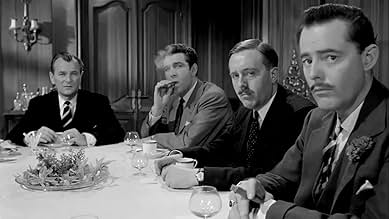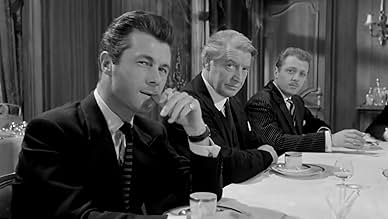NOTE IMDb
7,2/10
5,4 k
MA NOTE
Récemment mis à la retraite, le lieutenant-colonel Hyde décide de se venger et réunit sept officiers renvoyés de l'armée pour commettre un casse.Récemment mis à la retraite, le lieutenant-colonel Hyde décide de se venger et réunit sept officiers renvoyés de l'armée pour commettre un casse.Récemment mis à la retraite, le lieutenant-colonel Hyde décide de se venger et réunit sept officiers renvoyés de l'armée pour commettre un casse.
- Nomination aux 1 BAFTA Award
- 1 victoire et 1 nomination au total
John Adams
- Police Constable in Final Scene
- (non crédité)
Histoire
Le saviez-vous
- AnecdotesJack Hawkins was ill with cancer during filming. Shooting was shut down for several days.
- GaffesAs Col. Hyde is showing the movie of the exterior of the bank that they will rob he tells his cohorts, "This is the view of the bank that you will see three weeks from today, gentlemen." Sure enough, during the events just before the actual robbery: As the guard opens the rear door of the armored truck, the same-dressed man with a newspaper in his overcoat pocket walks past and, as the guards put the boxes on the flatbed truck, the same two women in light overcoats walk past.
- Citations
Major Race: Is that your wife?
Lt. Col. Hyde: Yes.
Major Race: Is she dead?
Lt. Col. Hyde: No, no. I regret to say the bitch is still going strong.
- ConnexionsFeatured in Le casse du siècle (2007)
Commentaire à la une
A British army colonel, pensioned off and embittered, assembles a motley group of specialist, criminal and deviant ex-officers who share his bitterness. He has in mind a bank robbery. They arm themselves, courtesy of their former employer, then execute the robbery impeccably, right in the centre of the City of London. The bags of loot are filled, but, at the pictures, crime seldom pays....
That this film has been reviewed as a comedy demonstrates, once again, that British and American are two cultures disguised by a common language. The humour here, of that characteristically British sardonic kind, is incidental to a drama of frustration, disappointment and inadequacy. The humour is just the way the British speak.
The clever and low key "raid" on the army training centre is finely done. So much so that it overshadows the robbery itself and therefore slightly unbalances the action.
This is one of those films, craftsmanlike and enjoyable, yet not desperately exciting, that finds its greatest value precisely in being a period piece. The League of Gentleman is a fascinating social document. Made in 1959, it catches the moment in British history when, as its Empire dissolved, the social infrastructure that supported it and that had made Colonel Hyde what he had been, also disintegrated. This aspect could almost have been deliberate, explaining the very long opening sequence (another unbalancing factor) that introduces us to the seven main characters. There are shockingly frank moments: the honourable man with the overtly promiscuous wife; the gigolo; the religious fraudster (or pervert - the message is obscured); another of the heroes an "other man", a homosexual; the pressure of life in a small house with a loud television set. So, too, the casualness with which machine guns are used in a robbery by men trained in the code of gentlemen. The dull and seedy presentation of Hyde's home and base, large but far from grand, is further evidence of the decline of his class. So, too, a robbery that was intended as a hymn to the effectiveness of military planning, brought to naught by one stupid mistake and a small boy.
Yet this is not a sententious film, their is no preaching, none of that British nostalgia for the old ways, but almost a respect for the robbers and a recognition that life had to become more ruthless as a stiff society began to flex. How it was elsewhere, I do not know, but this watchable film will show anyone what was happening in Britain just before the Sixties began to swing.
That this film has been reviewed as a comedy demonstrates, once again, that British and American are two cultures disguised by a common language. The humour here, of that characteristically British sardonic kind, is incidental to a drama of frustration, disappointment and inadequacy. The humour is just the way the British speak.
The clever and low key "raid" on the army training centre is finely done. So much so that it overshadows the robbery itself and therefore slightly unbalances the action.
This is one of those films, craftsmanlike and enjoyable, yet not desperately exciting, that finds its greatest value precisely in being a period piece. The League of Gentleman is a fascinating social document. Made in 1959, it catches the moment in British history when, as its Empire dissolved, the social infrastructure that supported it and that had made Colonel Hyde what he had been, also disintegrated. This aspect could almost have been deliberate, explaining the very long opening sequence (another unbalancing factor) that introduces us to the seven main characters. There are shockingly frank moments: the honourable man with the overtly promiscuous wife; the gigolo; the religious fraudster (or pervert - the message is obscured); another of the heroes an "other man", a homosexual; the pressure of life in a small house with a loud television set. So, too, the casualness with which machine guns are used in a robbery by men trained in the code of gentlemen. The dull and seedy presentation of Hyde's home and base, large but far from grand, is further evidence of the decline of his class. So, too, a robbery that was intended as a hymn to the effectiveness of military planning, brought to naught by one stupid mistake and a small boy.
Yet this is not a sententious film, their is no preaching, none of that British nostalgia for the old ways, but almost a respect for the robbers and a recognition that life had to become more ruthless as a stiff society began to flex. How it was elsewhere, I do not know, but this watchable film will show anyone what was happening in Britain just before the Sixties began to swing.
Meilleurs choix
Connectez-vous pour évaluer et suivre la liste de favoris afin de recevoir des recommandations personnalisées
Détails
- Date de sortie
- Pays d’origine
- Langue
- Aussi connu sous le nom de
- The League of Gentlemen
- Lieux de tournage
- Société de production
- Voir plus de crédits d'entreprise sur IMDbPro
Box-office
- Budget
- 192 000 £GB (estimé)
- Durée1 heure 56 minutes
- Couleur
- Mixage
- Rapport de forme
- 1.66 : 1
Contribuer à cette page
Suggérer une modification ou ajouter du contenu manquant

Lacune principale
By what name was Hold-up à Londres (1960) officially released in India in English?
Répondre

































